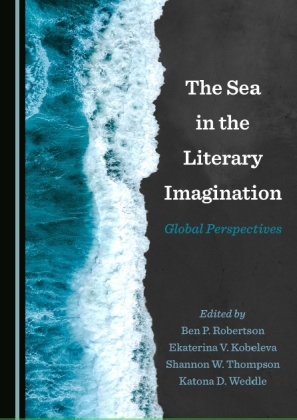  Robertson, Ben P., Ekaterina V. Kobeleva, Shannon W. Thompson, and Katona D. Weddle, eds. The Sea in the Literary Imagination: Global Perspectives. Newcastle-upon-Tyne: Cambridge Scholars Publishing, 2019.
Robertson, Ben P., Ekaterina V. Kobeleva, Shannon W. Thompson, and Katona D. Weddle, eds. The Sea in the Literary Imagination: Global Perspectives. Newcastle-upon-Tyne: Cambridge Scholars Publishing, 2019.
The Sea in the Literary Imagination explores nautical themes in a variety of literary contexts from multiple cultures. Including contributors from five continents, the book emphasizes the universality of human experience with the sea while focusing on literature that spans a millennium, stretching from the medieval romance to twenty-first-century reimagining of classic literary texts in film. These fresh, newly-written essays engage in discussions of literature from Britain, the United States, India, Chile, Turkey, Spain, Japan, Colombia, and the Caribbean.
Contents
Acknowledgments
Introduction by Ben P. Robertson, Ekaterina V. Kobeleva, Shannon W. Thompson, and Katona D. Weddle
European Literature: The Hazards of the Sea
Chapter One, “Floating Ideas: Memory and the Sea in Medieval Romances” by Jamie McKinstry
Chapter Two, “Ocean of Troubles: Hazards of Seafaring in the Court Records
of the House of Trade in Seville in the Late Sixteenth Century—
The Sea as Seen from Juridical Literature” by A. B. Fernández Castro
Chapter Three, “‘It seems to float ever—forever—’: The Dispersing Ocean in Valperga and Prometheus Unbound” by Lucy Johnson
Chapter Four, “‘The Problem of Longitude’: Unplottable Subjects, the Imaginary Pacific, and Queer Seas in Joseph Conrad’s ‘The Planter of Malata’” by Alice M. Kelly
Asian Literature: Seascapes and the Environment
Chapter Five, “The Ocean as a Space of Maturation in Nagai Kaf¬u’s Critique of Modernity” by G. M. Follaco
Chapter Six, “Women at the Helm: Manasa-Mangal Kavya in Perspective” by Nirojita Guha
Chapter Seven, “The Land Ethic and Human-Sea Relations in Yasar Kemal’s The Sea-Crossed Fisherman and Sait Faik Abasiyanik’s ‘Sinagrit Baba’ and ‘Death of the Dülger’” by Erkin Kiryaman
South American Literature: The Unknowability of the Sea
Chapter Eight, “Traveler’s Tales: The Sea and Memories of Exile in Marjorie Agosín’s Chile” by Elena M. De Costa
Chapter Nine, “The Unseen Sea and the Sublime: Some Cognitive Aesthetic Conceptualizations in Modernist and Avant-Garde Latin American Poetry” by Juan Ignacio Muñoz Zapata
Chapter Ten, “Transforming the White Whale in Monique Roffey’s Archipelago” by Danette DiMarco
North American Literature: Melville and the Sea
Chapter Eleven, “Fiction and Verity: Textured Narratives in Herman Melville’s
Mardi and a Voyage Thither” by Kelvin Beliele
Chapter Twelve, “Mermaids as Exotic Others in Melville’s South Sea Fiction” by Hanna Straß-Senol
Chapter Thirteen, “Driving Home Yarns: Oceanic Language and Deconstruction in Melville’s Moby-Dick” by Megan Barnes
Chapter Fourteen, “Spatiality at Sea: The Vortex in Herman Melville’s Moby-Dick” by Alexandra Meany
North American Literature: Transcendentalism, Modernism, and the Sea
Chapter Fifteen, “Picturing the Ocean Wilderness: Henry David Thoreau’s Cape Cod and the Meaning of Progress” by Kathleen Healey
Chapter Sixteen, “‘It wasn’t any good diving unless you had a big hammer’: Psychoanalyzing Hemingway’s ‘After the Storm’” by Paul E. Blom
Chapter Seventeen, “The Ship of Fools and the Purge of Rejects” by Mongia Besbes
Global Literature: Popular Culture and the Sea
Chapter Eighteen, “Young Adult Cli-Fi and the Risen Sea” by Tara Moore
Chapter Nineteen, “Self-Actualization, Control, and the Kraken: Literary and Film Personalities who Wield Power through a Notorious Sea Monster” by Rachel L. Carazo
Chapter Twenty, “The Roles of Sea Monsters and Consumption: Retelling Jane Austen,
Re-Sensing the Sea, and Creating Sea Sensibility” by Rachel L. Carazo
Literature and the Sea: Final Thoughts
Chapter Twenty-One, “Literature of the Sea: Lessons Learned” by Paul Guajardo
Contributors
Index
|

 Robertson, Ben P., Ekaterina V. Kobeleva, Shannon W. Thompson, and Katona D. Weddle, eds. The Sea in the Literary Imagination: Global Perspectives. Newcastle-upon-Tyne: Cambridge Scholars Publishing, 2019.
Robertson, Ben P., Ekaterina V. Kobeleva, Shannon W. Thompson, and Katona D. Weddle, eds. The Sea in the Literary Imagination: Global Perspectives. Newcastle-upon-Tyne: Cambridge Scholars Publishing, 2019.